 By Staff By Staff
April 16th, 2021
BURLINGTON, ON
Halton Municipalities and Conservation Halton resumed their 2018 Ontario court case against the proposed Milton CN truck-rail hub to ensure CN complies with laws that protect the health of residents and the environment.
This Ontario case by the Halton Municipalities and Conservation Halton seeks to protect the thousands of residents that live near the CN lands in Milton. “We are taking immediate action to address the serious concerns of Halton residents with respect to the proposed CN truck-rail hub in Milton,” said Halton Regional Chair Gary Carr. “No proposal should be allowed to go ahead before it complies with our laws. CN must be accountable to those who will be most affected by the project, and not just the Federal Government, which ignored its duty to protect the health of Halton residents when it announced its approval of this project.”
The Ontario case follows the January 21, 2021 decision by the Federal Government on this CN proposal. This federal decision allows CN to proceed further in the approvals process without addressing the conclusion reached by its own review panel that this proposal is likely to cause significant adverse effects on human health that cannot be mitigated. This Federal decision was also contrary to the panel conclusions that the proposed intermodal was likely to cause five other significant effects on air quality, the environment, and farmland that cannot be mitigated.
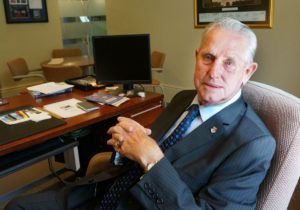 Milton Mayor Gord Krantz “The Federal Government has let us down and ignored the expertise of the panel it appointed,” said Milton Mayor Gordon Krantz. “Let me assure all Miltonians, we will continue fighting and advocating for you at all levels of government and in the courts.”
Since CN announced this proposal, the community has voiced its opposition because of serious concerns with its adverse effects on air quality and human health, the safety of local travel in the surrounding area, and the site’s close proximity to more than 34,000 current and future residents, one hospital, 12 schools, and two long-term care homes.
This Ontario court case is the second court action taken this year by the Halton Municipalities. On February 21, the Halton Municipalities and Conservation Halton filed an application with the Federal Court of Canada to have the court review the decisions made by Federal Cabinet and the Minister of Environment and Climate Change that has allowed CN’s proposal to proceed further without addressing the many serious problems identified by the federal panel.
“The Federal Review Panel found that this project is likely to cause harm on human health,” said Burlington Mayor Marianne Meed Ward. “Regional Council has a responsibility to do everything in its power to hold CN accountable and ensure compliance with provincial and municipal laws.”
“While the Federal Government has given highest priority to the economic interests of CN, we put our duty to protect the health and safety of residents first,” said Oakville Mayor Rob Burton.
“Our communities and local representatives at all levels have voiced their concerns about CN’s proposed project,” said Halton Hills Mayor Rick Bonnette. “We need to continue to be a unified voice for Halton residents.”
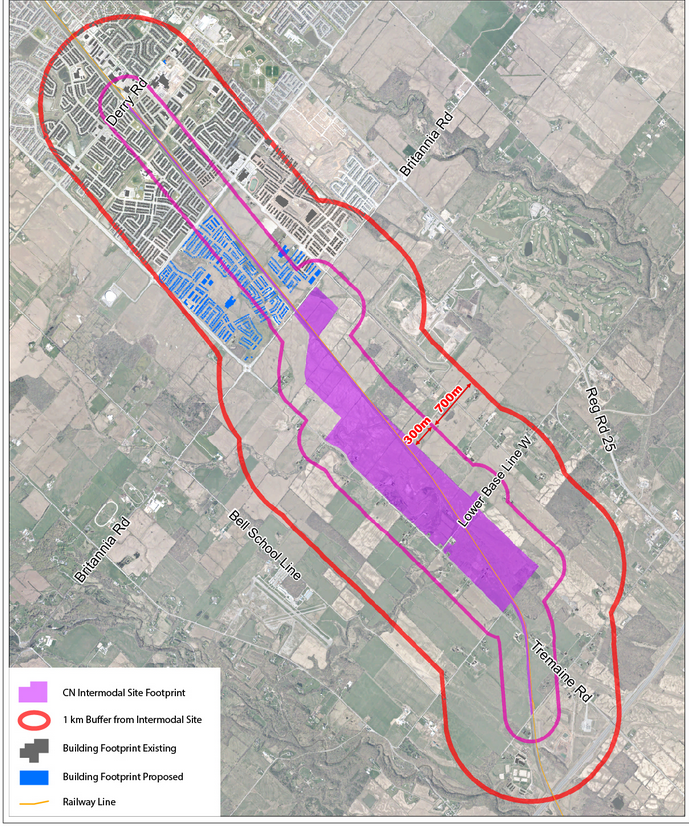 A fear bigger that the proposal is that if it does get built – it will be expanded at some future date “Protecting the environment and safety of our communities remains Conservation Halton’s top priority,” said Conservation Halton Board Chair Gerry Smallegange. “We stand with our municipal partners and will continue to advocate for the well-being of residents in our watershed.”
CN’s proposed truck-rail hub in Milton would create only a small number of jobs and not provide the kind of investment that has been planned for and approved in Regional Official Plan Amendment 38 (ROPA 38). Although concerns with significant adverse environmental effects on air quality and human health are paramount, this proposal’s permanent harm to anticipated employment, investment, and municipal finances is also significant. CN is ignoring the substantial benefits it promised in 2008 when it sought and ultimately obtained changes to Regional Official Plan Amendment 38. The low employment and investment numbers now advanced by CN for the current proposal could be achieved elsewhere by modernizing its existing Brampton facility.

 By Lana Parker By Lana Parker
April 16, 2021
BURLINGTON, ON
Despite the lack of data documenting benefits to children, and emerging evidence of several drawbacks and harms, the Ontario government is discussing making full-time online schooling a permanent “choice” in public education.
This idea is being introduced without adequate research, and stands to become the latest measure that raises inequality and threatens the viability of education as a public good.
The Globe and Mail obtained an Ontario Ministry of Education presentation dated March 22, 2021, detailing the prospect of continued virtual learning after the COVID-19 pandemic. The province aims to partner with TVO to offer “fully independent online learning” for “Ontario and out-of-province secondary students” and also mentions continuing “synchronous remote learning” for elementary students.
The proposal coincides with apparent plans to continue to help fund Ontario education by selling curriculum abroad. In 2015, Ontario reported it had agreements with 19 international private schools that pay the province to deliver the Ontario curriculum.
Unpacking the known harms
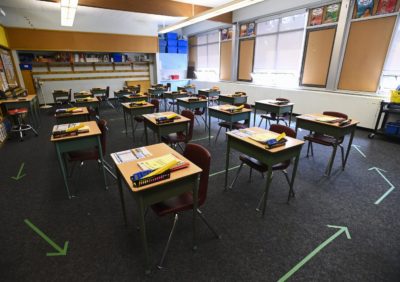 While the COVID-19 environment has produced unique challenges, many of the greatest difficulties for young people have been associated with the forced shift out of schools and into online learning. Online learning does not replace the complex, relationship-oriented learning and social environment in schools. While the COVID-19 environment has produced unique challenges, many of the greatest difficulties for young people have been associated with the forced shift out of schools and into online learning. Online learning does not replace the complex, relationship-oriented learning and social environment in schools.
Fully online learning has had consequences for mental health, with increased feelings of social isolation. There have also been challenges to physical health, as youth grappled with a lack of physical activity and deteriorating eyesight. Even among older youth learners, motivation and engagement prove difficult to sustain online, with a higher potential for dropping out and worse outcomes for disadvantaged students.
Despite the negative outcomes associated with full-time online study for youth and without sufficient data to support its rationale, the Ontario government is introducing an unasked for “choice” that would set a detrimental precedent for public education.
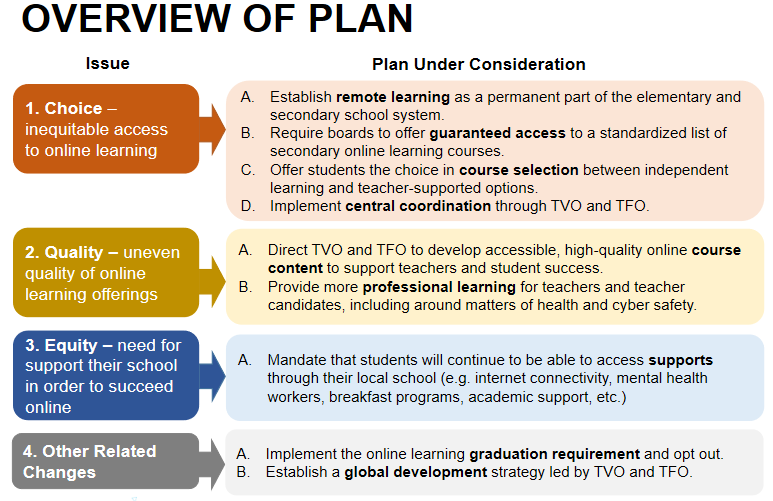
More screen time?
Some might argue that getting students comfortable with online technologies prepares them for future study and the workforce. In my research on youth literacy and online engagement, however, I explore how student proficiency in navigating technology should not be mistaken for understanding complex information.
 My work is part of a wider body of emerging research that examines how students make sense of the online environment — and how being online affects their literacy skills, including their capacities to form critical questions and navigate misinformation and disinformation. My work is part of a wider body of emerging research that examines how students make sense of the online environment — and how being online affects their literacy skills, including their capacities to form critical questions and navigate misinformation and disinformation.
I have also determined that literacy learning can be strengthened when students and teachers explore the emotional implications of contentious issues in a classroom community. In other words, leaving students alone in front of screens for even more of their already online-immersed day does not improve their critical thinking or engagement.
 For adolescents, learning online doesn’t replace in-person interactions with teachers, other students and community members. These interactions, far from superficial or inconsequential, are at the heart of how students learn well. In the pandemic, many teachers have voiced concerns about how an online environment hampers their ability to tailor learning and to support their students with the full range of strategies that are available in the classroom. For adolescents, learning online doesn’t replace in-person interactions with teachers, other students and community members. These interactions, far from superficial or inconsequential, are at the heart of how students learn well. In the pandemic, many teachers have voiced concerns about how an online environment hampers their ability to tailor learning and to support their students with the full range of strategies that are available in the classroom.
Yet another worrying aspect is the risk to student privacy. There is ongoing concern about how tech companies may be gaining unprecedented insight into children’s lives and how data may be used.
There are also issues of tech monopolies that muddy the line between public education and private enterprise.
Generating revenue
Students have opportunities to engage with online learning in Ontario’s current framework. There is no need to introduce compulsory online courses or the option of full-time online learning.
With all the issues implied by full-time online learning, why would Ontario consider making this a permanent feature of public education? Before the pandemic, in February 2020, the government .
In a confidential Ontario government document written sometime between March and August 2019 and obtained by the Toronto Star, the current Ford government detailed a plan to dovetail cuts to school board funding with the opportunity to “to develop (a) business model to make available and market Ontario’s online learning system to out-of-province and international students.” It is telling that the document did not foreground the benefits of full-time online learning for students.
The reasons for this shift can be attributed to the ongoing drive to privatize public education through the twin aims of reducing costs and generating new revenue. The 2019 document also mentioned examining “feasible options for selling licensing rights to courses/content to other jurisdictions.”
Curriculum sales
The current discussions should be seen in the context of Ontario’s drive to create revenue streams through international student tuition and sales of curriculum to international schools.
Ontario’s March 22 proposal for online schooling describes a plan to develop curriculum and offer an education with little teacher support.
This “business plan” follows Minister of Education Stephen Lecce announcing the appointment of a former CFL commisioner to the role of TVO’s CEO. TVO’s website has been recently retooled to include an emphasis on “digital learning.”
Potential future harms
For children, fully online learning creates the conditions for further educational inequality. It is a particular risk for children with special education needs.
It can also produce unintended consequences: a recent study based in Ecuador showed female students working online were more likely to spend time doing housework than their male counterparts. It is not unimaginable that some families could select online schooling for their children so they could help with household work, care for family members and potentially supplement family income by entering the labour market earlier. The move also risks limiting opportunities for extra-curricular socialization and learning, including experiences with the arts and sports.
Once poorly researched educational policy comes into practice, it is difficult to undo irrespective of data that details its harms. Such has been the case with the introduction of standardized testing in Ontario, which marginalizes newcomers and students with exceptionalities, and encourages a narrow curriculum.
Over time, a policy of “choice” for full-time online schooling weakens public education by diluting in-person opportunities for students and eroding funding. An impoverished public system drives families into private schools, which further erodes the public good. Defunding and marketization will leave public education in a race to the bottom.
Background links:
Expanding student access to on line and remote learning – the provincial government agenda
Toronto reveals secret provincial government report about on-line learning –
Laura Parker is an Assistant Professor, Faculty of Education, University of Windsor

 By Staff By Staff
April 15th, 2021
BURLINGTON, ON
Conservation Halton had an item in a recent newsletter that included the following notice:
 Administrative offices on Britannia Road “Conservation Halton is looking for a better way to engage with residents about flood risks on their property and within their community and we’re hoping you can help. If you live in Burlington, Oakville, Milton or Halton Hills, please click here to complete a short survey. (It should only take five minutes of your time!):
A Gazette reader said: “Residents of south Burlington have been trying to impress upon the City the myriad water issues experienced in our community, and they’ve just heard numerous Millcroft residents express concerns about what will happen if the Argo development gets the green light. This is something that all Burlingtonians should be concerned about.”
 Ever since the 2014 flood Conservation Halton has upgraded the data gathering equipment they now – they are able to spot problems as they are developing and take appropriate action. Ever since the 2014 flood Conservation Halton has upgraded the data gathering equipment they now – they are able to spot problems as they are developing and take appropriate action.
Their colour coded notices appear in the Gazette regularly.

 By Staff By Staff
April 15th, 2021
BURLINGTON, ON
Pam Damoff, Member of Parliament for Oakville North Burlington brings some good news for the educators and their students:
$656.5 million dollars in funding to upgrade Ontario’s schools to make them safer for kids and teachers. Over $26 million dollars will be provided to schools in Halton Region to foster a safe and healthy environment for our valued educators, students, parents, and school staff.
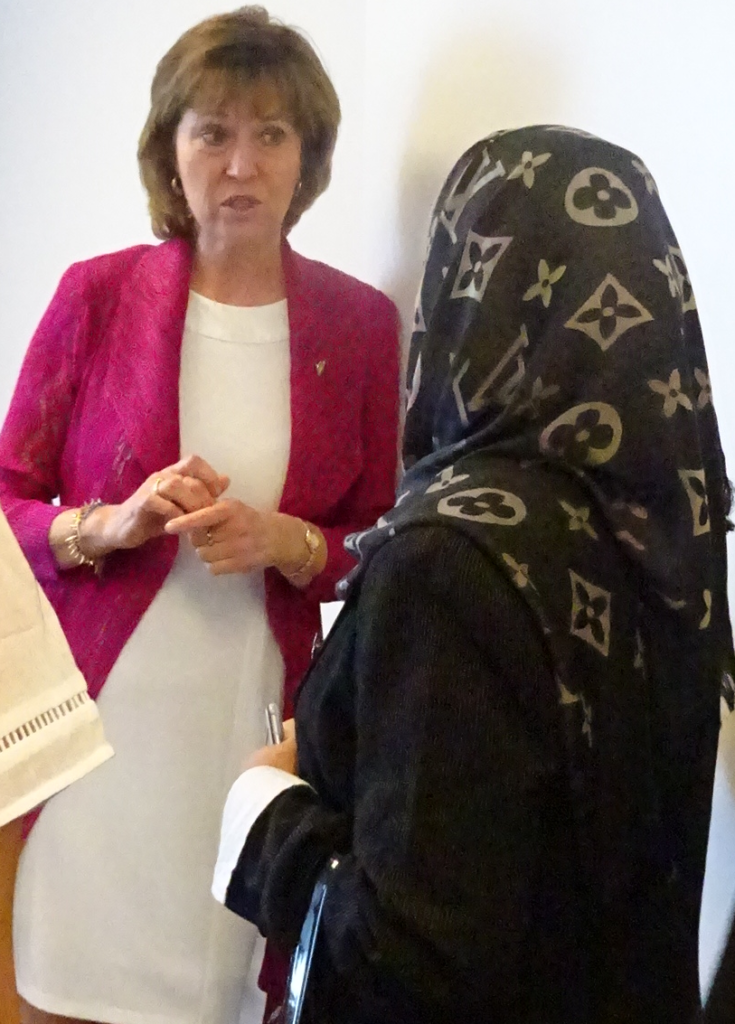 MP Pam Damoff speaking with a constituent in her Oakville office “The wellbeing of our community is of the utmost importance as we continue the fight against COVID-19.
“This investment is being made jointly with the provincial government through the COVID-19 Resilience Infrastructure Stream, with 80% of the funding from our government” explained Damoff who added that: ” The majority of the funding will support ventilation projects that improve air quality in classrooms.
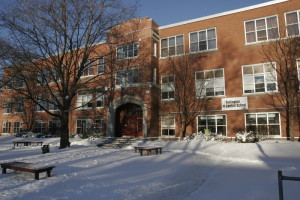 Students at Central High would be mighty pleased to see air conditioning installed. Additional projects include installing water bottle refilling stations to improve access to safe drinking water, investing in network and broadband infrastructure to support remote learning, and space reconfigurations such as new walls and doors to enhance physical distancing.”
The students at Central high school will watch with some anticipation to learn if their school is going to see some air conditioning equipment. Climate change and the need to circulate air in schools built decades ago is no longer something nice to have.

 By Eric Vandewall, President and CEO Joseph Brant Hospital By Eric Vandewall, President and CEO Joseph Brant Hospital
April 15th, 2021
BURLINGTON, ON
A short walk from Joseph Brant Hospital is Spencer Smith Park, a beautiful green space by the waterfront where, in past years, friends and families would gather in large numbers to enjoy the warm weather, music and food festivals and open-air movie nights.
We know how difficult this year has been for everyone – we feel it too. We all want to return to a time when we could enjoy the simple pleasures of pre-pandemic life. But we urge you to be patient, stay home and follow all public health measures. We need your help to avert a crisis.
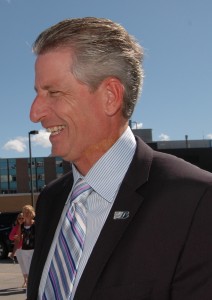 Eric Vandewall Across Ontario, we are seeing enormous strain on our hospitals, and JBH is no exception. The new Variants of Concern have quickly taken hold and are fueling this third wave, causing a rapid surge in cases and hospitalization of patients with more severe symptoms.
At JBH, we are currently at 94% capacity and reached full capacity this past weekend. In just two weeks, the number of COVID-19 patients in our care has more than doubled and continues to increase daily.
We are doing everything we can to make beds available to the rising number of patients – both COVID-19 and non-COVID-19 – who require urgent, life-saving care. We have put all non- urgent surgeries and procedures on hold. We have added four intensive care beds and will be adding three more by the end of this week – 31 beds in total. But resources are limited, and may not be enough if the demand continues.
 Pandemic Response Unit We have been working with our regional and provincial partners in managing COVID-19 care, so that no one hospital is overwhelmed. We have the capability to transition our Pandemic Response Unit – which is currently serving as a Halton Region Vaccination Clinic – back to providing COVID-19 care within 24 hours. We would continue to run the clinic, which has already administered more than 10,000 vaccinations, in another part of the hospital.
Like many of you, our JBH staff and physicians have made enormous sacrifices during the pandemic, and your unwavering support has meant so much. You helped us get through it, and we need your support once again.
Please follow public health guidance. Stay home unless it’s essential, such as buying food or picking up medication. Wear a mask, wash your hands frequently, physically distance from others and do not gather with anyone outside of your household.
There are skeptics who will try to convince you that this is all unnecessary. I can assure you, they are wrong. If this upward trend continues hospitals will be overwhelmed.

 By Staff By Staff
April 15th, 2021
BURLINGTON, ON
The Ontario government has launched a 90-day consultation to obtain feedback on how to strengthen municipal codes of conduct. With the support of the Association of Municipalities of Ontario (AMO), the province is working to better ensure that municipalities, councillors and heads of council maintain a safe and respectful workplace.
Link to the survey is HERE
Jill Dunlop, the Associate Minister of Children and Women’s Issues is holding round tables with a variety of municipal stakeholders on how to strengthen accountability measures for members.
“Our government has been absolutely clear that we will not tolerate workplace harassment or discrimination of any kind,” said Associate Minister Dunlop. “It’s critical that everyone knows there are accountability measures in place for members who violate municipal codes of conduct. Our consultation will help determine what changes, if any, are required to ensure everyone can feel safe and respected in the workplace.”
The government is also collecting feedback on AMO’s recommendations for holding municipal councillors accountable, including increased financial penalties, suspension for certain violations, removal from office in certain circumstances, and better training and standards for integrity commissioners. This feedback is critical to ensuring effective accountability measures are put in place for members of council who violate their municipal code of conduct.
 It’s critical that everyone knows there are accountability measures in place for members who violate municipal codes of conduct. “Municipal councils are looking for new tools and new measures to address modern challenges in local government,” said AMO President Graydon Smith. “Where there are serious code of conduct violations, municipal councils need the authority to take actions that are measured, appropriate and effective.”
Comments for the consultation are welcome through the online survey by July 15, 2021. Anyone can participate in the online survey to provide feedback. Municipalities are also encouraged to provide official feedback through the online survey. This is another step the Ontario government is taking to hold members who violate codes of conduct accountable for creating unsafe work environments.
“I encourage every Ontarian to participate in this process and share their thoughts and comments on how to bring effective accountability to municipal governments,” said Steve Clark, Minister of Municipal Affairs and Housing. “We must ensure that the right tools are available and that above all people feel safe and supported.”
The role of the Integrity Commissioners municipalities hire will be given a close look with the potential for much needed training.
Burlington had difficulty getting strong relevant codes of conduct in place. The two Goldring Council’s were at times content with what they add or were quarreling amongst each other on what they could live with in terms of a Code of Conduct.
There came a point where the then city manager had to get council to adopt the model the province had created and was prepared to impose on Councils that did have a code in place.

 By Julie Hunt Gibbons By Julie Hunt Gibbons
April 15th, 2021
BURLINGTON, ON
Many of the challenges of this pandemic have been solved through the use of technology. The tools of technology have allowed the world of work to continue from a safe distance. Education in Canada has been no different.
Last year’s March – June shut down in elementary, secondary, and post secondary in Ontario was facilitated by the use of online learning, both synchronous and asynchronous, through a host of different learning management systems and educational platforms and applications. This year our provincial public health challenges have varied by population and demographic and we have used technology to respond accordingly.
 Failure to Disrupt: Why Technology Alone Can’t Transform Education Here in Halton, and the surrounding GTHA, students have experienced a variety of synchronous and asynchronous fully online and hybrid learning models in response to the need for student cohorting and swells in Covid-19 numbers. The recent pandemic response, coupled with decades of technological innovation and growing use, have led many people to cite technology as the panacea for educational change in this province and around the globe. They would do well to read Justin Reich’s latest book, Failure to Disrupt: Why Technology Alone Can’t Transform Education” (2020).
Reich does not base his claims on recent pandemic events. In fact, he wrote this book prior to the onslaught of COVID-19 and points out that the supposedly transformative educational technology of the past decade has done little to revolutionize learning. He debunks claims such as:
Harvard Business School’s 2009 claim by Clay Christensen that predicted that half of all American secondary school courses would be online by 2019,
Sal Khan’s claim that Khan Academy videos would reinvent education,
Sebastian Thrun of Udacity’s claim that in 50 years we’d have only 10 institutions of higher education in the world as a result of the success of massive open online courses (MOOCs).
Sugata Mitra’s claim that students no longer need schools or teachers as groups of children with access to the internet could teach themselves anything.
 Computers will be part of classrooms – but they will not replace classroom teachers. Reich addresses MOOCs, autograders, computerized “intelligent tutors,” and widely adopted popular educational software in-depth and traces their hype, their potential,and their ultimate shortcomings. According to Reich, despite their economic success in making their creators wealthy, their benefit has been to primarily wealthy students and they have done little, if anything, to combat growing inequalities in education. Thus this has not been “true innovation” and has not radically changed the educational system in any way. Rather these tools have been adapted, tested, used or not used by educators within the system.
Technology does, and will, continue to play a crucial role in the future of education but as nothing more than a tool for classroom experimentation and the expansion of educators’ pedagogical toolkits.
None of this should come as a surprise; the pandemic has evidenced extreme growth in the use of educational technology, but the key lesson of our online learning experiments in a pandemic have been that there is a want and need for human interaction. Educators have the uniquely human skills to engage (or not engage) students. Education is at its essence a human skill and human pursuit. Change and improvement to education must come from human iterations. There is no magic technological wand.
I join Reich in his confidence that when we take stock of the education our schools provided in our schools during the pandemic, we will see evidence of many new technological classroom and teaching strategies reflective of staff learning and the practicing of technological skills. These are valuable skills and our schools can and should build on them, continuing the process of learning how to teach, learn, and use our digital tools more effectively. Educational improvement is a journey, not a destination and technology can shape and accelerate this journey but technology alone cannot transform education.
 HDSB Superintendent Julie Hunt Gibbons
Julie Hunt Gibbons Halton District School Board Superintendent of Secondary Program & Student Success, North West Oakville Family of Schools was a part of the team that created the iStem courses that began at the Aldershot High school.
Julie was born in Ottawa, graduated from TA Blakelock in Oakville then attended: University of Western Ontario | B.A. Hon. | Sociology and Political Science; University of Windsor | MA. | Sociology (Socio-legal Studies) and University of Toronto |B.Ed. |Intermediate and Senior qualifications
Julie didn’t intend to be a teacher. She did a Masters in Sociology (Socio-legal studies) thinking it would be a good stepping stone to Law School. It was while working as a Teaching Assistant that she fell in love with teaching.

 By Pepper Parr By Pepper Parr
April 15th, 2021
BURLINGTON, ON
A number of weeks ago I heard a CBC interview about a book that talked about the concept of disruption and education.
 Disruption has bitten deeply into retail markets and has all but killed local newspapers. Disruption has bitten deeply into retail markets and has all but killed local newspapers.
Uber turned the taxi business upside down.
The Ontario government is now thinking about disrupting education and teaching both elementary and high school students on-line.
Halton District School Board Superintendent Julie Hunt Gibbons, who will be retiring in June after a long career as a teacher, did a review of Failure to Disrupt: Why technology alone cannot transform education
Her review led us to changes the provincial government is actively pursuing.
The Hunt Gibbons interview appears in the Gazette today – the scoop on what the provincial government appears to be planning will be in the paper on Friday.
Here is a glimpse of what the government is discussing internally at the Ministry of Education.
The full report will be published on Friday.
 A portion of the documents being used by Ministry of Education Consultation group. 
 By Andrew Drummond By Andrew Drummond
April 14th, 2021
BURLINGTON, ON
This past weekend, over 2000 NDP delegates from across the country met at a virtual convention to discuss what direction the party should take moving forward and what policies are important for the NDP to push in the next federal election. The convention was not without its hiccups, and technical difficulties dominated the event in its first 24 hours. Delegates with a disability in particular were frustrated as captioning for the proceedings was not immediately available.
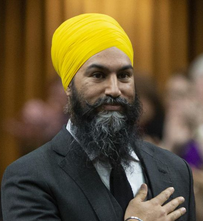 Jagmeet Singh – a resounding 87% endorsement The most publicly notable part of any political convention in Canada is the vote to endorse the Party Leader. NDPers gave Jagmeet Singh a resounding 87% endorsement which was higher than expectations. Jagmeet also gave a keynote address on the Sunday of the convention where he compellingly argued that without the NDP’s influence the country’s vulnerable would have been for worse off than they were. He quoted a line from a popular meme online: “I’ve heard it said that in this pandemic, we’re all in the same boat. I disagree. We’re not actually in the same boat. We’re certainly in the same storm, but some of us are in leaky lifeboats.” Singh also called out that the Liberal proposal for the CERB program had been $1,000 per month with a 3-month maximum. Only through the pressure tactics of the NDP caucus was the amount and duration increased.
But the core of any convention is the passing of policy the NDP grassroots wants the party to fight the next election on. More than 800 policy resolutions were submitted by riding associations across the country, and delegates prioritized those and then debated over the three days of the convention. The most notable new policies passed are below:
 He’s just an old fashioned millionaire. Make the Wealthy Pay Their Share (80% marginal tax on incomes over $1,000,000)
Delegates in favour of this resolution argued passionately that Canadians earning this amount of income should be more responsible for ensuring a more equitable distribution of wealth across Canada. While exact figures aren’t available, the 99th percentile income in Canada is less than $300,000 per year. The number of Canadians making over $1,000,000 is incredibly small and yet a tax on those individuals would secure considerable funding for programs to help all Canadians.
Re-Establish a federal minimum wage at $20/hour
Delegates on this resolution were focused on the relationship between a minimum wage and a living wage. And after some discussion, delegates were aligned to the idea of $20/hour being necessary because of the incredibly high cost of living in many areas.
Halton was given as an example where the living wage here was $20.38/hour the last time it was calculated in 2019. The wage would only impact federally regulated companies but would hopefully have a significant impact on local economies as well.
Add Long Term Care standards to the Canada Health Act
The experience of Ontario has been noticed by people across the country. Delegates have been outraged at the poor conditions LTC residents have been forced to live in while the private companies managing the sites have been giving out huge dividends to their shareholders. With this policy, the NDP takes a stand that across the country LTC homes will no longer be allowed to be run as for-profit enterprises. It would also enshrine in the Canada Health Act a commitment that any federally funded LTC facility be required to provide a minimum of 4 hours of daily care.
Permanent Paid Sick Days for federally regulated companies
The research in the lead up to this policy shows that 58% of Canadians do not have any paid sick leave. Beyond that, the much touted CRSB program is not suited to day-to-day needs. When a worker starts getting sick, they need that first day off to prevent others from getting infected. The NDP passed a policy demanding 7 permanent sick days per year for all federally regulated companies. It is a very big step towards normalizing paid sick days as required in all businesses.
Canada’s Place in the World
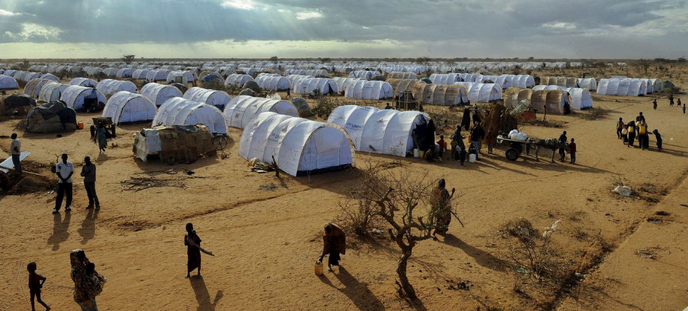 Refugee camp support has always been a large part of Canadian foreign aid. Historically, the NDP convention has shied away from taking stands on foreign policy. Resolutions calling for international action rarely get prioritized and debated. However, at this convention, the NDP delegates prioritized 2 powerful resolutions calling for action from Canada. First was to unequivocally support farmers in India against the repressive corporate takeover being funded by the Modi government. The second was calling for a boycott of all products made in the Israeli occupied territories as well as an embargo on arms sales to Israel until a fair peace is established with the Palestinian people. This was a landmark policy choice that puts the NDP clearly on the side of those being oppressed and demands Canada take action on the world stage.
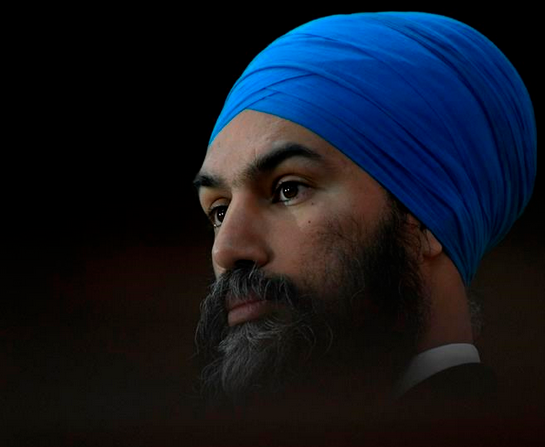 Jagmeet Singh, leader of the New Democratic Party NDP convention 2021 was not perfect. The technical glitches marred what could have been a bigger unifying experience for delegates (Amends were made by refunding delegate fees to all members with a disability). But policies were passed that will drive the NDP platform for the imminent federal election expected later this spring. They are bold, progressive policies that will brand the NDP clearly as the most progressive platform between the major parties. They also give a clear strategy to escaping the economic downturn caused by the pandemic.
The 2021 NDP Convention made clear that the NDP members have a vision for what Canada should be and how it should take care of its people so no one is left behind. Protecting LTC homes, and fighting for a federal minimum wage will make real, material difference in the lives of Canadians. The biggest message from convention 2021 was that the NDP members share a common vision with Jagmeet Singh and are passionate about fighting for that vision in the next election.
Andrew Drummond was the NDP candidate for Burlington in the last provincial election.

 By Staff By Staff
April 14th, 2021
BURLINGTON, ON
We closed our border to the Americans when Trump was president. The State of Minnesota has closed its border crossings into Canada.
 Whatever happened to those Welcome to America signs? The American Centre for Disease Control (CDC) is now saying that even those who are fully vaccinated could be infected and spread COVID-19 variants if hey visit Canada.
The CDC rates COVID-19 travel advisories from Level 1 (low) to Level 4 (very high), and it has labeled Canada a Level 4 danger zone. The highest level warrants the following advice from the CDC:
Travelers should avoid all travel to Canada.
“Because of the current situation in Canada even fully vaccinated travelers may be at risk for getting and spreading COVID-19 variants and should avoid all travel to Canada.
“If you must travel to Canada, get fully vaccinated before travel. All travelers should wear a mask, stay 6 feet from others, avoid crowds, and wash their hands.”
Canada closed its border to the U.S. to nonessential travelers in March 2020. More recently, emergency regulations were issued to mandate that anyone entering the country must quarantine for 14 days (some exceptions), provide contact information and monitor themselves for symptoms of COVID-19.
The ban on most nonessential travel to Canada from the U.S. is in place until April 21, though it could be extended.

 By Pepper Parr By Pepper Parr
April 13th, 2021
BURLINGTON, ON
It is disturbing when the City Manager feels he has to send out a message to the public asking people to be kind and considerate when dealing with people – adding a focus on the city staff he manages.
“We’re all in this pandemic together – Please be kind.
 A very poor quality screen shot of City Manager Tim Commisso taking part in a virtual Council meeting. He must be working out of a very uncomfortable location. “We get it. We’re in another Provincial State of Emergency that includes a Stay-at-Home Order, with additional restrictions to help control the spread of COVID-19. People are tired of having to stay home, wear masks, wash their hands a lot and anxious about vaccines.
“This is why it is more important than ever to be patient and be kind to your neighbours, fellow residents and workers that serve you in our community.
“From the beginning of the pandemic, the health and well-being of our community and staff has been and continues to be the City of Burlington’s top priority.
“The City continues to coordinate efforts to protect the public and staff from the spread of COVID-19, while maintaining essential City services.
“We ask that you be considerate and kind to City staff doing their jobs. Frontline City personnel have been working tirelessly to serve the public, despite the risk, throughout this pandemic and City staff continue to work remotely whenever possible to ensure seamless delivery of programs and services.
“Under the City’s Zero Tolerance Policy and as part of the City’s social media commenting guidelines, unacceptable, abusive behavior will not be tolerated. Words hurt: Using abusive language can have a direct and harmful impact on the people who are doing their best to help you.
“As residents continue to rediscover many of their favourite spaces and activities in the city, City services may look different as we work to stop the spread of COVID-19. The City’s commitment to providing the community with essential services remains a priority.
“We are all in this together. We’re here to help you so let us do our jobs by being respectful and following the rules and bylaws that are in place to protect us all.”
“We are all in this together” – apparently some don’t appear able to get that message.

 By Staff By Staff
April 13th, 2021
BURLINGTON, ON
The New Demorats came out swinging today – they too want to ensure that teachers are vaccinated before they return to school – whenever that is.
Clearly the teacher vote is up for grabs – the Liberals want to do the same thing.
And, if students are mini virus spreaders taking what they have at home to school and they taking what they pick up at school it would make sense to vaccinate the teachers.
Let’s put some data behind those assumptions – and if the science is there – for heavens sake vaccinate them. There won’t be a better time to get the job done,
“Vaccinating teachers now is a critical step if Ontario hopes to keep child care centres open, and to re-open schools safely said Official Opposition NDP Leader Andrea Horwath
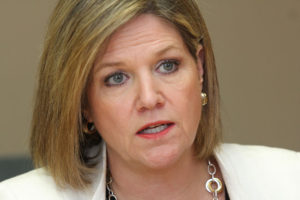 Official Opposition NDP Leader Andrea Horwath Horwath’s call comes after Doug Ford ordered schools closed indefinitely, and families and early childhood educators express fears that child care could be shut down next.
The Leader of the Opposition continues: “Child care workers are frontline heroes. They have been looking after little ones — especially the children of essential workers — during the shutdown of schools, and they are worried about their safety as the third wave worsens. And we know teachers and education workers are anxious to get their vaccines before returning to classrooms,” said Horwath. “Meanwhile, students and parents are bracing for another round of school closures with no end in sight. An action plan would give everyone hope for a safe return to daily life.
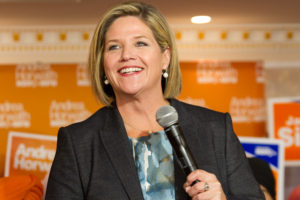 Andrea Horwath: If called upon – could she form a government? “Doug Ford marched us right back into another classroom shutdown because he didn’t want to spend the money on education,” said Horwath. “I believe our children’s safety is worth the investment. If I were premier, I’d be vaccinating teachers, education and child care workers now, and I’d be making urgent investments in a safe return to schools.”
Despite several regions shutting down all schools prior to this week, there were 12,280 school-based COVID-19 infections in the last 14 days, plus 913 cases in child care centres.

 By Pepper Parr By Pepper Parr
April 13th, 2021
BURLINGTON, ON
Members of Council are working out new approaches to meeting with their constituents.
With the next election not that far away the need to thicken the relationship with the voters becomes essential.
 Ward 4 Councillor Shawna Stolte had made a practice of setting up a couple of coffee urns and lets her people know that you could find her at Denningers early Saturday morning on a specific date. People got to know and would drop by with their issues – sometimes a decent crowd sometimes just a couple. The point was she was available –and it worked. Ward 4 Councillor Shawna Stolte had made a practice of setting up a couple of coffee urns and lets her people know that you could find her at Denningers early Saturday morning on a specific date. People got to know and would drop by with their issues – sometimes a decent crowd sometimes just a couple. The point was she was available –and it worked.
Covid put a stop to that approach. Stolte, ever the innovator, decided she would hold virtual events – held one last night that went well.
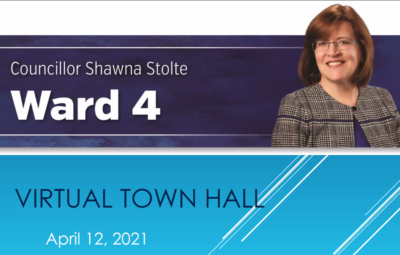 They are not the “anyone can drop in” type of event. You had to register and if you lived in the ward Stolte’s assistant would send you a link that got you in the door as it were. They are not the “anyone can drop in” type of event. You had to register and if you lived in the ward Stolte’s assistant would send you a link that got you in the door as it were.
The Gazette was told that these were not public events per se – they were open only to people in the ward.
Earlier in the day we had a conversation with a person who had bought a property in the Pinewood Cove area and was having a very difficult time getting the changes he wanted to make to a property he bought before moving in – he wasn’t able to get the clearances he needed. .
He didn’t, technically live in the ward and didn’t think attending would do much for him. He did take part in the Zoom event last night but finds himself no further ahead.
Stolte explained that things were not moving as well as everyone wanted them to in the Planning department and getting a building permit was close to impossible. They are seriously understaffed when it came to getting building permits. Stolte explained the One Window approach that was being created – that single window meant that anyone going to the Building permit people would be assigned a Project “manager” who would shepherd their project from start to finish.
As Stolte explained – they weren’t quite there yet – which is really not good customer service. Someone needs to rattle some chains and clear out the backlog so that people can get on with living their lives.
This particular individual said he has been told that there are no problems with his application – it is just going to take time to move it through the process. He has his trades people lined up but fears he is looking at a winter build – there is no word on just when the “being there” would occur.
Stolte gave a quick overview of what the budget looks like – where the money goes and where Council was able to do some cost cutting.
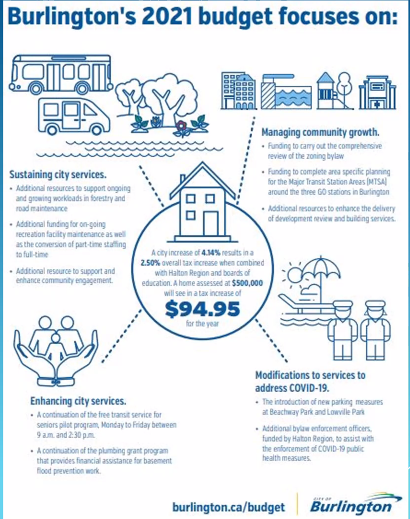
Unfortunately Stolte, like almost everyone else at city hall, has swallowed the Kool Aid when it comes to explaining the tax increase.. The tax increase this year is 2.5% – which is true. She then explained that the tax figure is an averaging of the amount of taxes that are paid to the Region and to the school boards. Burlington does all the collecting.
What she didn’t explain was that city Councillors have absolutely no influence on the school board tax; they have some influence on the Regional tax but Burlington has just 7 of the 24 Regional Council votes.
Burlington council members decide on what the city tax rate is going to be and this year it went from 2.99 in 2020 to 4.14 in 2021. Finance has projected something int the order of 5% for 2022
To use the 2.25 %number as the 2021 tax increase is misleading – dishonest actually and is a habit the bureaucrats and the politicians need to put an end to.
A lot of time was spent on the housing initiative the city has taken on. It appears to be shaping up as the issue Mayor Meed Ward will use as the strongest election platform plank come May of 2022 when election campaigning can start. The rest of Council will jump on that band wagon.
Housing at a price that younger people can afford is an issue – Council has spent a lot of time crafting policies and procedures that they expect will get the city to the point where they will have a plan they can put before the public, Hard to argue with something that could put people in badly needed decently price accommodation.
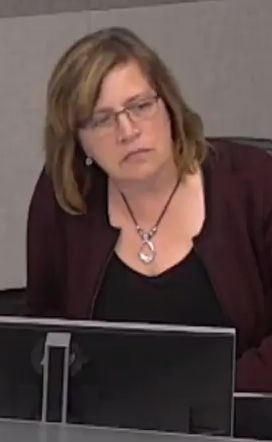 Councillor Stolte looking for a response to her motion. 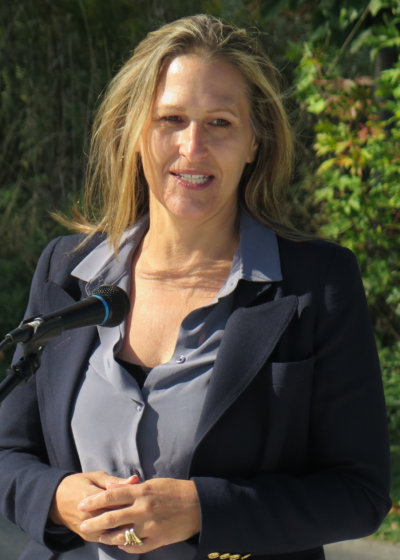 Mayor Marianne Meed Ward Stolte made it clear that the city will not be building homes – what they want to do is create an approach to providing homes that are badly needed. They talk in terms of working with different stakeholders, collaborating with people who have a strong interest in housing – perhaps making some city owned land available to a group who, under the right circumstances, would build homes that would be “attainable”
Is it a pig in a poke? Far too early to tell.
The organizational structure is a compromise with what council wanted and what the city manager said he could work with.
There is a Steering Group and a Working Group.
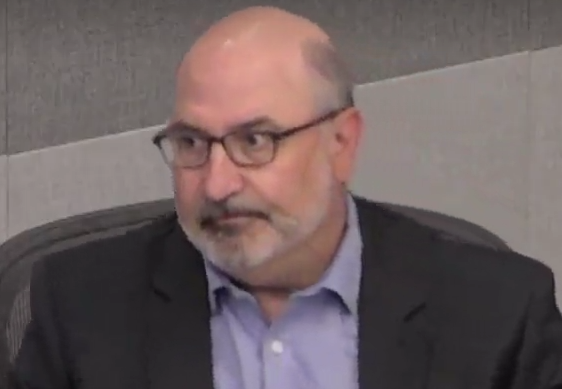 City Manager Tim Commisso Every idea will be run through the Steering Group, which will not have any council representation and will be chaired by the City Manager, will however tell council about every idea they looked at.
The working group will be made up of 20 people. At this point we know that the Mayor and Councillors Stolte and Sharman will be on that committee. The rest of the spots are open to people who apply.
Just what the working group is going to do is not clear but there will be about 20 people on it.
City Staff are assembling a Working Group in support of the Housing Strategy to advise on local issues, be champions for the Housing Strategy and to provide key insights from a diversity of backgrounds, experiences and expertise. If you are interested, please fill out the form
The Steering Group is in the process of hiring a consultant and has a budget of $250,000
What is really happening is this – Burlington has decided to horn in on what is a Regional responsibility. It will be interesting to see how that works out.
There is a lot of confusion about just what affordable housing is and who gets it. There is a very clear, but complicated formula that determines if a family or a person qualifies for assisted housing – something they can afford,
Affordable had a connotation that it was welfare housing – the people involved in this new initiative needed a new name – the bureaucrats and the politicians have solved that problem. The have coined the word “attainable’ meaning that the properties would be attainable if the price or cost is low enough.
Co-op housing has been doing that for decades with deep support from CMHC. But with co-ops the residents don’t have any equity – which means they are not in the housing game and able to take advantage of the fabulous property price increases that we have seen in the past year.
Stolte explained that the initiative that has everyone a flutter is a made in Burlington approach to a Burlington problem. Housing” she explained, “ is not just a building people live in – it is about community and community is very much what this council is all about.
A draft public engagement plan will be presented to Council late May or June.
This is a significant new policy initiative that reflects the views and aspirations of this Council. It needs to be watched very carefully – the intentions are laudable – the execution of those intentions is the concern.
Related news stories:
The affordable housing issue.
A virtual meeting where the public had some input.
City wants to get into the housing game Part of a series

 By Staff By Staff
April 13th, 2021
BURLINGTON, ON
It is such a hideous crime – Human Trafficking – the exploitation of people.
Crime Stoppers of Halton, in collaboration with the Halton Regional Police Service (HRPS) and the Halton Police Board, are bringing awareness of opioid/fentanyl drug trafficking within the Halton region, with an enforcement campaign.
From now until June 1, 2021, Crime Stoppers of Halton will take anonymous tips about opioid/fentanyl drug traffickers operating in Halton. If an arrest is made of a trafficker from your tip, you will be guaranteed the maximum $2000 reward.
In 2021, the HRPS has already responded to more than 80 suspected overdoses, 18 of which were fatal.
 Crime Stoppers of Halton Chair Jan Westcott Crime Stoppers of Halton Chair, said, “It’s time for Crime Stoppers, together with other community organizations, to aggressively tackle the scourge of opioid overdoses and deaths. Crime Stoppers of Halton intends to play a leading role in this effort.”
 “Opioids are increasingly common in Halton and have a high potential to be lethal” says Colin Jessome, Executive Director of Crime Stoppers. “We want to hear from you. If you know of someone trafficking these drugs please reach out to Crime Stoppers of Halton. Together we can remove these traffickers from Halton” “Opioids are increasingly common in Halton and have a high potential to be lethal” says Colin Jessome, Executive Director of Crime Stoppers. “We want to hear from you. If you know of someone trafficking these drugs please reach out to Crime Stoppers of Halton. Together we can remove these traffickers from Halton”
Visit Crime Stoppers -for more info or to submit a tip. You can also call 1-800-222-TIPS (8477). Contacting Crime Stoppers guarantees that you will remain anonymous and will not need to testify in court.

 By Staff By Staff
April 12th, 2021
BURLINGTON, ON
The Ontario government, in consultation with the Chief Medical Officer of Health, has made the difficult decision to move elementary and secondary schools to remote learning following the April break. This move has been made in response to the rapid increase in COVID-19 cases, the increasing risks posed to the public by COVID-19 variants, and the massive spike in hospital admissions.
Details were provided today by Premier Doug Ford, Christine Elliott, Deputy Premier and Minister of Health, Stephen Lecce, Minister of Education, and Dr. David Williams, Chief Medical Officer of Health.
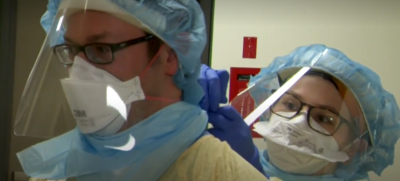 Medical professionals are being pushed beyond the limits – with triage decisions possible in the weeks ahead. “We are seeing a rapidly deteriorating situation with a record number of COVID cases and hospital admissions threatening to overwhelm our health care system,” said Premier Ford. “As I have always said we will do whatever it takes to ensure everyone stays safe. By keeping kids home longer after spring break we will limit community transmission, take pressure off our hospitals and allow more time to rollout our COVID-19 vaccine plan.”
With appropriate measures in place, schools have been safe places for learning throughout the pandemic, as confirmed by the Chief Medical Officer of Health and local medical officers of health and have demonstrated low rates of in-school transmission. However, increasing rates of community spread pose a threat to the health and safety of school communities. As a result, all publicly funded and private elementary and secondary schools in the province are to move to teacher-led remote learning when students return from the April break on April 19, 2021.
 Classrooms will remain empty – for how long? Depends on how well the public learns to listen. Private schools operating in-person this week are to transition to remote learning by April 15, 2021. This action is being taken in support of the Government’s broader efforts to limit the spread of COVID-19. Data will be assessed on an ongoing basis and health officials will be consulted to determine when it will be safe to resume in-person learning.
Child care for non-school aged children will remain open, before and after school programs will be closed and free emergency child care for the school-aged children of eligible health care and frontline workers will be provided. To protect the most vulnerable, boards will make provisions for continued in-person support for students with special education needs who require additional support that cannot be accommodated through remote learning.
“This was not a decision we made lightly, as we know how critical schools are to Ontario students. Our priority has always been to keep schools open, however sharply rising community transmission can put our schools and Ontario families at risk,” said Minister Lecce. “While Ontario’s plan has kept schools safe, as confirmed by the Chief Medical Officer of Health, we are taking decisive and preventative action today to ensure students can safely return to learning in our schools.”
Case rates, hospitalizations, and ICU occupancy are increasing rapidly, threatening to overwhelm the health care system. The number of COVID-19 hospitalizations in the province have increased by 22.1 per cent between the period of April 4 and 10, 2021.
In addition, during this same period of time, Ontario has seen
the number of COVID-19 patients in intensive care increase from 494 to 605.
Since April 8, the province has been under a provincewide Stay-at-Home order, requiring everyone to remain at home except for essential purposes, such as going to the grocery store or pharmacy, accessing health care services (including getting vaccinated), for outdoor exercise with your household in your home community, or for work that cannot be done remotely. As Ontario’s health care capacity is threatened, the Stay-at-Home order, and other new and existing public health and workplace safety measures, will work to preserve public health system capacity, safeguard vulnerable populations, allow for progress to be made with vaccinations and save lives.
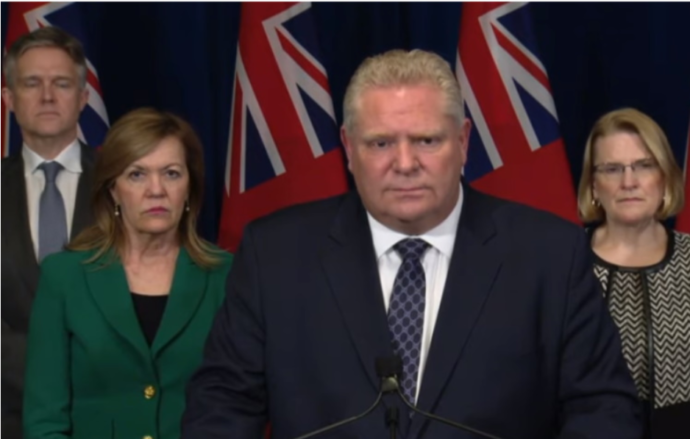 One has to wonder how much longer Doug Ford can get up every day and continue to tell the people that he is doing everything he can and pleading with people to say home as he watches the numbers of infections rise. With students moving to remote learning, vaccine prioritization of education workers who provide direct support to students with special education needs across the province, and all education workers in select hot spot areas, starting with Peel and Toronto, will continue. Starting today, special education workers across the province and education workers in Peel and Toronto hot spots will be eligible to register for vaccination by calling the provincial vaccine booking line at 1 833 943 3900. More information is available at Ontario.ca/covidvaccine.
It is critically important that as Ontarians receive the vaccine, everyone continues to wear a mask, maintain physical distancing when outside of their immediate household and frequently wash their hands. As well, continue to monitor for symptoms of COVID-19 and get tested if symptoms are present.
“As we continue to see rapid growth in community transmission across the province, it is necessary to take extra precautions and measures to ensure the continued health and safety of students, teachers and their families,” said Dr. David Williams, Chief Medical Officer of Health. “As the fight against this third wave of the pandemic continues, everyone must continue following all public health and workplace safety measures and stay at home to prevent further transmission of the virus, so we can once again resume in person learning in our schools.”
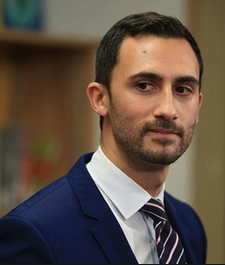 Minister of Education: Stephen Lecce Steven Del Duca, the Leader of the Ontario Liberal Party who has yet to earn a seat in the Legislature said in a prepared statement that: “Just yesterday, Minister Lecce wrote to parents telling them that all publicly funded schools would remain open after the April Break. One day later, Doug Ford is closing them for weeks. The in-fighting between Doug Ford and his education minister is putting our children and education workers at risk, and Lecce should be fired for it.”
“It’s time for Doug Ford to adopt our Ontario Liberal plan, which includes capping class sizes at 15, investing in urgent repairs to ventilation in classrooms, and vaccinating all education workers over the April Break so that schools can be safe and stay open for good after this closure. It’s time to end Doug Ford’s chaos once and for all by making schools safe.”
And doesn’t Doug Ford wish that it was that easy.

 By Staff By Staff
April 12th, 2021
BURLINGTON, ON
The evolution of health measures, recommendations, guidance and legislation pertaining to COVID-19 has proved challenging to keep up with. For this reason, the Halton Regional Police Service (HRPS) is using QR (Quick Response) code technology to keep its officers and community better informed with up-to-date and accurate information regarding COVID-19.
The HRPS has created a QR code that is available to frontline officers, which provides them with direct access to a page on the haltonpolice.ca website that warehouses links to the following:
• The province’s Zone and Restrictions (and public health measures associated with each zone)
• The provincial COVID-19 response framework
• The Halton Region Public Health COVID-19 webpage
• The Halton Region Public Health COVID-19 Vaccines webpage
• City of Burlington COVID-19 webpage
• Town of Halton Hills COVID-19 webpage
• Town of Milton COVID-19 webpage
• Town of Oakville COVID-19 webpage
• The phone number for the Halton Regional Police Service COVID-19 enforcement hotline
With efficient access to this information, our officers are better equipped to respond to COVID-19-related questions and incidents within our communities.
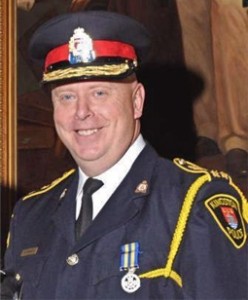 Halton Regional Police Services Chief Stephen Tanner . Halton Regional Police Chief Stephen Tanner explains: “This past year of living through COVID-19 has been unprecedented. As our understanding of how the virus is transmitted evolved, legislation, by-law and public health recommendations shifted quickly and frequently. Recognizing that it can be difficult to keep track of these changes, we believe we’ve found a way to facilitate.
I’m proud that our members arrived at an innovative solution that allows for easy access to provincial, regional and municipal updates relating to COVID-19, as well as the latest updates on the Regional vaccine rollout. It is important that we leverage technology at this time to best inform and protect the public that we serve.”
A copy of the QR code has been made available and is attached to this release.
© Halton Regional Police Service Headquarters 2485 North Service Road West, Oakville, Ontario, L6M 3H8

 By Pepper Parr By Pepper Parr
April 12th 2021
BURLINGTON, ON
City Council spent three days last week on a lot of business that covered everything.
We fell a bit behind – promise to get caught up the next few days.
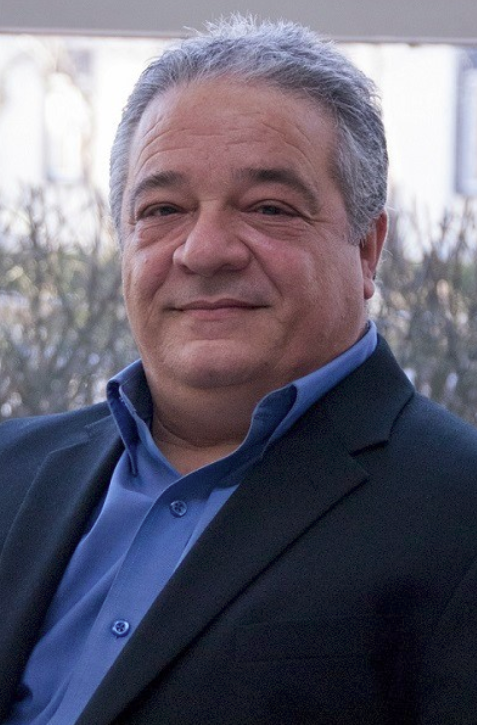 Vito Tolone, Director of Transportation – plagued by parking problems – while he stick handles a Master Plan for Cycling. Parking was on the agenda – this is Burlington after all. Director of Transportation Vito Tolone mentioned that checking on parking meters downtown is a “little lax” right now. You get 90 minutes for 25 cents as it is – little point in having bylaw people checking on those that stick around for longer.
The parking in the Beachway got a lot of attention. Much discussion on using concrete block to keep vehicles from parking – Mayor wanted flower boxes instead – thinks the concrete is ugly. But the flower boxes are expensive. Armour stone appears to be the option of choice – however the Parks and Recreation department thinks there might be an opportunity to engage the public by holding painting contests to see who can come up with the nicest art for the concrete blocks..
Councillor Sharman was running the numbers while Council members debated the merits of the different options.
Whatever they decide on – people will be asked to pay $20 to park all day, or $2.50 an hour.
The better minds at city hall are looking for ways to create a discount for those who live in Halton Region – the Beachway is Regional Park so whatever discount is available has to be for people from all four municipalities.
Staff and Council members expect the Beachway to be a major attraction making parking an issue – it was certainly that last summer.
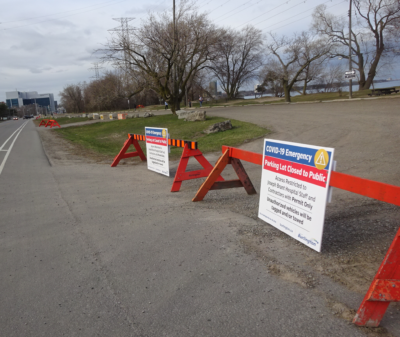 There are going to be a number of ways to prevent people from parking. Among the options are concrete blocks – flower boxes and Armour Stone. The Communications people are being asked to come up with a way to tell the hordes that are expected that parking will be limited but parking in the downtown core will be free and there is a bus line that runs from the John Street terminal right through the Beachway. They are thinking of creating drop-off areas for people who want to let passengers out while the driver goes hunting for a parking space.
The city will have Park Ambassadors who will travel in pairs explain and advising people on what they can do and can’t. Word is that they will have distinctive uniforms. Fashionable maybe.
It all goes to Council later this month where final decisions get made.
More to come for sure.

 By Ray Rivers By Ray Rivers
April 12th, 2021
BURLINGTON, ON
A record breaking 4000 Canadians participated in the Liberals’ fully virtual 3 day, 60 hour, biennial policy convention this past weekend. And 26 policy resolutions were adopted including; a national pharmacare program, a universal basic income (by a vote of 491-85), and national standards for long term care, as the top three priorities. These now become party policy.
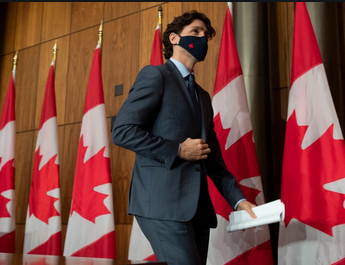 Prime Minister Justin Trudeau Mr. Trudeau delivered a blistering closing address which looked every bit like a pre-election stump speech. Trudeau claims he has no interest in an election at this time. But the polls are good for the Liberals, Canadians are finally seeing vaccines arrive, and the opposition is divided.
Erin O’Toole is battling his own party of climate change deniers, and a-woman’s-right-to-choose is the ghost still haunting the party. Then Mr. O’Toole has some suicidal issues of his own making; namely, bringing back assault weapons and killing the CBC.
The new Green Party leader finds herself in a tussle with the party’s old guard amid accusations of racism. The NDP is struggling to find an issue on which it can out-left the Liberals, and their leader has faded into the background and become the de facto silent partner in the Liberal minority government. And Trudeau must know that every single election during COVID has returned the incumbents, and even propelled a few into a majority position.
Mr. O’Toole is calling for a public inquiry into Canada’s response to the pandemic. That piece of theatre could spell trouble for Mr. Trudeau, given his government’s failings in border control, as recently reported by the Auditor General. Still the Liberals claim they’d welcome such an inquiry. Perhaps they figure it would allow them to focus on the failures of the provinces.
At the outset the provinces rejected Trudeau’s offer of invoking the federal emergency measures act and claimed jurisdiction over administering public health measures to keep the epidemic in check. And they have largely failed, repeatedly, except in Atlantic Canada, allowing this country to recently surpass the US in new COVID infection rates.
Given that most of the provincial premiers are political allies of Mr. O’Toole – one could ask where his voice was in any of this. And in an election Trudeau would claim credit for the economic measures he introduced: workers sick pay, wage subsidies and CERB; which just about everyone supported.
Trudeau has been pretty consistent at following through on his party’s resolutions. Cannabis legalization is a case in point. And he even tried to implement electoral reform before giving up and breaking his promise of change. But he has expressed dislike for the universal basic income policy which almost everyone else in his party wants. So people may be wondering whether Mr. Trudeau is really as liberal as one would expect given his record of financial deficits.
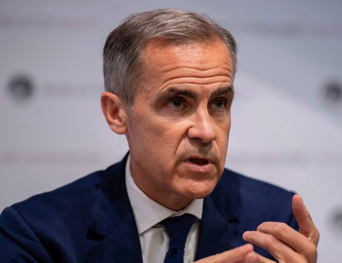 Mark Carney comes out of the closet – he’s a Liberal The keynote address by former Bank of Canada governor Mark Carney got the Liberal chattering class excited. Would he make a suitable replacement for Mr. Trudeau were the Liberals to lose the next election? Carney, who has finally come out of the closet to announce his liberalism, would bring a huge amount of financial credibility to a government now running up massive debt. Perhaps this could be another Paul Martin moment – someone loved by both liberals and fiscal conservatives.
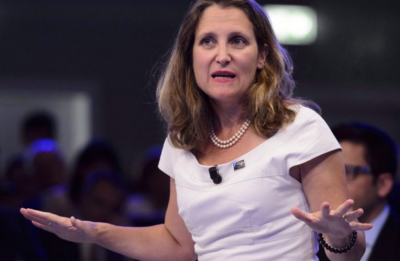 Chrystia Freeland,, Minister of Finance preparing a budget that will set new deficit records ? And speaking of money, Canada’s current finance minister, Chrystia Freeland, talked about a window of political opportunity for her pet initiative, a universal child care program. Among the other resolutions were a couple demanding a Canadian ‘green new deal’ and a post pandemic ‘green’ recovery. And, interestingly, the fourth priority item called for a high speed rail network.
All of these progressive measures will involve some new spending and Canada is already heavily into the red just from all the pandemic security blanket measures. So it was discouraging that relatively pocket-book painless resolutions to increase capital gains taxation and introduce an inheritance tax for estates valued over 2 million were defeated.
Perhaps the delegates think we can grow our way out of debt, or that we should wait for inflation to shrink the relative size of what we owe ourselves.
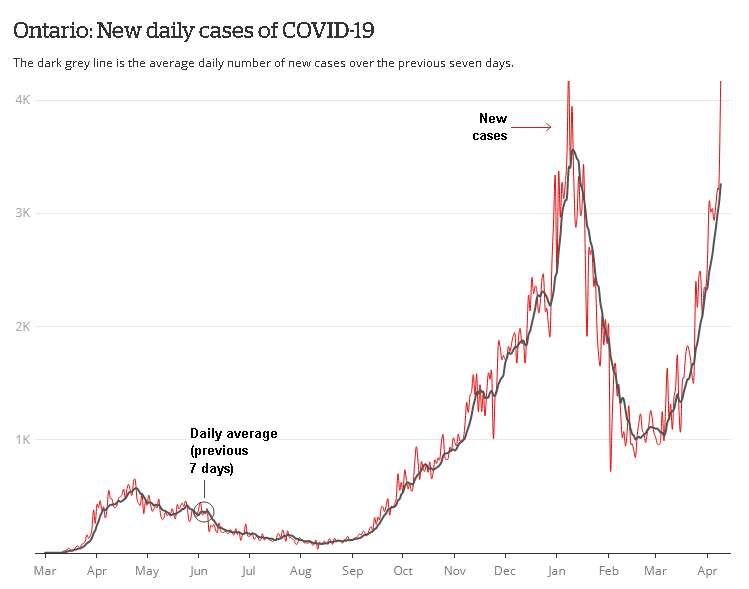
There wasn’t a lot of media coverage of either this event or the NDP convention on the same weekend. The front pages are mostly full of the passing of Prince Philip and the ongoing misery of COVID infections and deaths and the race against time to vaccinate our people. But, whether right or left or in the middle, media coverage of COVID has become more united and has coalesced around a common theme. Our governments have let us all down.
Still 4000 Canadians had enough faith in the future of the Liberal party to make their voices heard at this policy convention, even if it has to be conducted over the internet. And sadly even that number was smaller than the number of people who contracted viral infections in Ontario the day after the convention concluded.
 Ray Rivers writes weekly on both federal and provincial politics, applying his more than 25 years as a federal bureaucrat to his thinking. Rivers was a candidate for provincial office in Burlington where he ran against Cam Jackson in 1995, the year Mike Harris and the Common Sense Revolution swept the province. Ray Rivers writes weekly on both federal and provincial politics, applying his more than 25 years as a federal bureaucrat to his thinking. Rivers was a candidate for provincial office in Burlington where he ran against Cam Jackson in 1995, the year Mike Harris and the Common Sense Revolution swept the province.
Background links:
Liberal Convention – Priority Resolutions – Basic Annual Income –
Green New Deal – Mark Carney Coming Out – Mark Carney –
Our Governments Fail Us – Ontario Failures – Why Does Tam Still –
Lockdowns Meaningless – Public Health Canada Meltdown –

 By Pepper Parr By Pepper Parr
April 12th, 2021
BURLINGTON, ON
The weather was wonderful. Lots of people out and about.
I was driving south on John Street turning right onto Lakeshore where there were a good sized gathering of people sitting about. Traffic was a little clogged on Lakeshore – I was heading west to see what things looked like in the Beachway.
I was stunned by the number of people I saw sitting around – unmasked, side by side enjoying the sunshine.
Earlier in the day I was given the number of new infections reported by the province,
4456 new Covid19 cases.
The projection had been that we would reach 6000 new infections daily by the end of the month if we didn’t shut everything down.
Non-essential, elective surgery has stopped – the beds are needed for those who are very very sick due to Covid. My partner had her vaccination earlier in the week – she experiences pain and tightness in her arm. You worry – are you Ok, because I don’t think we know what Ok is anymore.
We are in trouble.
Most of the people I saw were young – high school maybe. They live in Burlington – and we are safe in Burlington. It is those other people who live elsewhere and in circumstances that aren’t as good as they are in Burlington that have to worry.
True enough – but this virus travels and it seems to be able to find groups of five to ten people and settle in.
NHL hockey games are cancelled because a team member has a temperature. One would think that those million dollar men on skates would be watched very closely and kept away from other people.
None of us are safe. That isn’t meant to be alarmist – it is the reality we have to live with.
That “abundance of caution” phrase is used by the politicians when they shut things down – it doesn’t appear to be something that most of us put in our pockets when we leave the house.
We are no longer able to gather as a “public” to express our concerns, offer our opinions or just enjoy the company of close friends. We learn of friends who have relatives facing critical health issues and we can’t drop by and visit with a casserole and some freshly baked bread in hand.
They miss out on needed support and we miss out by not being able to give that support. We are caring people put in a position where the opportunities to care get limited.
What is it we aren’t hearing?
And why?

 By Pepper Parr By Pepper Parr
April 10th, 2021
BURLINGTON, ON
OPINION
Is there anyone saying the provincial government is doing a good job in managing the pandemic – the only people who are saying anything positive are the politicians. Their advisors have been pressing for stronger measures to stop the spread of Covid19
Ontario is caught between a rock and a hard place. We don’t have any facilities where we can manufacture the virus and we are having problems getting the vaccines the federal government has ordered.
 Managing the supply of the vaccines under contract isn’t working very well. The federal government has contracts with just about every vaccine company but none of them are delivering on time.
There are delays upon delays. The supply was so short that the rate at which second doses of the vaccines was increased. Difficult to understand how the scientists can invent something and issue instruction saying the product should be applied four weeks apart and then, when the province finds they don’t have enough to deliver on that prescription – they make the second dose months later – and that seems to be OK.
It has to be because the supply just isn’t there.
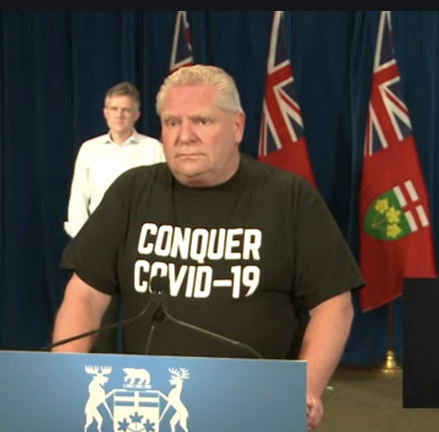 Listening to the advice of people who put the public ahead of politics is proving to be a challenge for the Premier. The politicians are playing political games – Prime Minister says I sent you 2 million doses – and the Premier replies – sure you did – yesterday.
This is beginning to look and sound like a Gilbert and Sullivan comic opera.
We failed the seniors’ community, because the most of the long term care homes are run by the private sector where profits come before service.
We can of course vote the politicians out of office – any assurance that the next lot that get elected will be any better?
The public service is a good place to work. That sector however, seems to have forgotten what serving actually means.
There have been some upsides. The science community has performed, for the most part, superbly. They were able to come up a vaccine in a very short period of time. And the leadership from the science community has pressed the governments to listen.
Finding men and women who bring courage, tenacity and a belief that public service is a calling is the challenge for the rest of us. Hoping for the best isn’t going to be enough.
Salt with Pepper is the musings, reflections and opinions of the publisher of the Burlington Gazette, an online newspaper that was formed in 2010 and is a member of the National Newsmedia Council.

|
|
 By Staff
By Staff
















 While the COVID-19 environment has produced unique challenges, many of the greatest difficulties for young people have been associated with the forced shift out of schools and into online learning. Online learning does not replace the complex, relationship-oriented learning and social environment in schools.
While the COVID-19 environment has produced unique challenges, many of the greatest difficulties for young people have been associated with the forced shift out of schools and into online learning. Online learning does not replace the complex, relationship-oriented learning and social environment in schools.
 My work is part of a wider body of emerging research that examines how students make sense of the online environment — and how being online affects their literacy skills, including their capacities to form critical questions and navigate misinformation and disinformation.
My work is part of a wider body of emerging research that examines how students make sense of the online environment — and how being online affects their literacy skills, including their capacities to form critical questions and navigate misinformation and disinformation. For adolescents, learning online doesn’t replace in-person interactions with teachers, other students and community members. These interactions, far from superficial or inconsequential, are at the heart of how students learn well. In the pandemic, many teachers have voiced concerns about how an online environment hampers their ability to tailor learning and to support their students with the full range of strategies that are available in the classroom.
For adolescents, learning online doesn’t replace in-person interactions with teachers, other students and community members. These interactions, far from superficial or inconsequential, are at the heart of how students learn well. In the pandemic, many teachers have voiced concerns about how an online environment hampers their ability to tailor learning and to support their students with the full range of strategies that are available in the classroom.

 Ever since the 2014 flood Conservation Halton has upgraded the data gathering equipment they now – they are able to spot problems as they are developing and take appropriate action.
Ever since the 2014 flood Conservation Halton has upgraded the data gathering equipment they now – they are able to spot problems as they are developing and take appropriate action.


















 Ward 4 Councillor Shawna Stolte had made a practice of setting up a couple of coffee urns and lets her people know that you could find her at Denningers early Saturday morning on a specific date. People got to know and would drop by with their issues – sometimes a decent crowd sometimes just a couple. The point was she was available –and it worked.
Ward 4 Councillor Shawna Stolte had made a practice of setting up a couple of coffee urns and lets her people know that you could find her at Denningers early Saturday morning on a specific date. People got to know and would drop by with their issues – sometimes a decent crowd sometimes just a couple. The point was she was available –and it worked. They are not the “anyone can drop in” type of event. You had to register and if you lived in the ward Stolte’s assistant would send you a link that got you in the door as it were.
They are not the “anyone can drop in” type of event. You had to register and if you lived in the ward Stolte’s assistant would send you a link that got you in the door as it were.





 “Opioids are increasingly common in Halton and have a high potential to be lethal” says Colin Jessome, Executive Director of Crime Stoppers. “We want to hear from you. If you know of someone trafficking these drugs please reach out to Crime Stoppers of Halton. Together we can remove these traffickers from Halton”
“Opioids are increasingly common in Halton and have a high potential to be lethal” says Colin Jessome, Executive Director of Crime Stoppers. “We want to hear from you. If you know of someone trafficking these drugs please reach out to Crime Stoppers of Halton. Together we can remove these traffickers from Halton”











 Ray Rivers writes weekly on both federal and provincial politics, applying his more than 25 years as a federal bureaucrat to his thinking. Rivers was a candidate for provincial office in Burlington where he ran against Cam Jackson in 1995, the year Mike Harris and the Common Sense Revolution swept the province.
Ray Rivers writes weekly on both federal and provincial politics, applying his more than 25 years as a federal bureaucrat to his thinking. Rivers was a candidate for provincial office in Burlington where he ran against Cam Jackson in 1995, the year Mike Harris and the Common Sense Revolution swept the province. 




